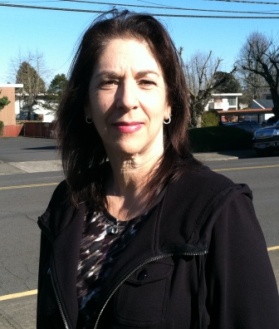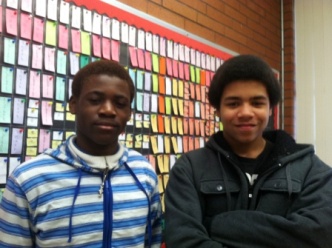 Parkrose Superintendent Karen Gray has pioneered Restorative Justice, starting in Parkrose Middle School Parkrose Superintendent Karen Gray has pioneered Restorative Justice, starting in Parkrose Middle School |
Trayvon Martin was a typical Black teenager in many ways. And one of the ways he was typical was that he had a history of suspension from school. This week the world learned that the Florida teen was on a 10-day suspension for having in his possession a pipe and an empty baggie.
In fact, that's why the 17-year-old Florida teen was living at his father's fiancée's gated community on the fateful evening when he lost his life.
Schools in the Portland-metro area are pioneering a new approach to school discipline that aims to prevent suspensions and expulsions. Restorative Justice takes an educational approach to discipline. Supporters say it is our best hope for keeping students of color in school and on track.
"We know that excluding kids from school doesn't work," says Tammy Jackson, an administrator in Portland Public Schools' Office of Student Services.
Trayvon Martin had been suspended from school twice before: for being late and for skipping class. Read the comment threads of news articles on the case, and you'll find that some people believe those facts mean that Martin was "a juvenile delinquent" a "drug addict" or even a "thug."
It's too late now to prevent Trayvon Martin from being suspended. Yet if his school had used Restorative Justice instead, he might never have encountered George Zimmerman.
Civil Rights
National studies tell us that school discipline is a bedrock civil rights issue.
In fact, as Lisa Loving reported March 6, in her article for The Skanner News, "Suspensions and Expulsions: The School to Prison Pipeline," getting suspended is an all-too-common rite of passage for African American students, especially Black boys. From pre-school on, Black students are suspended and expelled at far higher rates than other students for exactly the same behavior.
"We know that it raises the risk factors for students," Jackson says. "They are less likely to graduate. They're more likely to have challenges in life. They are more at risk for criminal behavior and more at risk for going to prison. Excluding kids is not effective."
Not to mention the topsy-turvy logic of suspending a student for not going to school. Or the fact that almost one in five teens Martin's age have tried marijuana – with White students statistically more likely to be regular users.
"What we do when we exclude students is we push them out of school," says Jackson. "I say that's exactly when we need to hold on to them tighter."
Pilot Program
Parkrose was the first school district in the metro-area to try Restorative Justice, or RJ for short. With grants from Multnomah County and the City of Portland, Parkrose has been using RJ for four years now. Ask students and teachers and they will tell you that the in-school program is a powerful tool for learning, changing behavior and increasing the peace.
"We absolutely wanted to use it as a way to break the school to prison pipeline," says Parkrose School Superintendent Karen Gray. "We believe it is part of our mission to keep children in school.
"Too many of our kids, and mostly our kids of color, were being excluded from school and then dropping out and ending up in the juvenile justice system."
Superintendent Gray says the Parkrose RJ program is working, and she has the data to prove it. District estimates show that last school year (2010-11) at Parkrose Middle School, for example, RJ prevented 158 days of suspension, 36 days of in-school suspension and four calls to the police. The program also returned $287.40 in restitution to victims of theft.
"Last year the best data we have suggests that without RJ there would have been 100 more days of suspension," Gray says. "And the more a child is suspended or excluded, the further behind he gets in his classes and the more isolated and frustrated he becomes. They act out and then they drop out. That's a fact.
"So if we can mediate the conflict we can keep them in school where they belong, and out of jail."
Some behavior can't be solved with Restorative Justice. So where do schools draw that line?
"The line is a weapon," Gray says. "It's selling drugs. It's bomb threats. In that case, I'm sorry, but in those cases we have to step it up. But where we can use Restorative Justice, we should."
Portland Public Schools last year started a Restorative Justice program in Rigler Elementary. This year it added King Elementary, Beverly Cleary Middle School and Grant High School. Tammy Jackson says she's crunching the numbers now and the preliminary data looks good.
 Caleb Gbotoe and Odessa Harris avoided a fight through Parkrose Middle School's Restorative Justice program. Now the two friends can't remember why they were mad. Full story coming soon. |
Resolution at Grant
Many Portlanders heard the words Restorative Justice for the first time this year after students at Grant High School broke silence about locker room misbehavior. Police were called in and filed a report that showed horseplay among some athletes had turned into bullying, and possibly even sexual abuse.
Much ink was spilled calling for severe penalties and criticizing the school staff. But the boys who spoke out, and their families, did not seek prosecution. After an investigation, police dropped the case.
Grant staff and students decided to use Restorative Justice meetings to handle the issues raised. One boy was excluded from Grant and is now at another school, but three others stayed put, a decision supported by all the teens involved.
Jackson says that Restorative Justice was a better choice for the students and for the wider school community.
"They had to be accountable to their school community, which is in fact, a much greater lesson," she says. "Restorative Justice helps students develop their integrity. A lot of students can develop that integrity, but we just don't give them that chance."
COMING SOON: RJ in action: How two boys stopped fighting and became friends














































































































































































































































































































